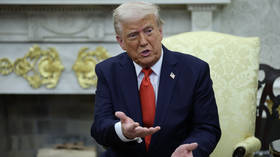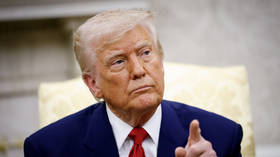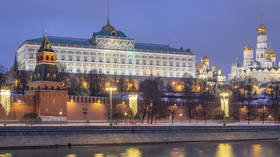Mafioso tactics: Smaller countries must fall when US says so
Resorting to blackmail tactics in order to push through a UN resolution allowing the use of external force shows that the US is extremely frustrated that Assad has been able to hold on to power in Syria for so long, activist Brian Becker told RT.
Moscow said on Monday that Western governments are trying to blackmail Russia into supporting their draft of the Syrian resolution, threatening to end the UN observer mission if a deal is not reached. The director of the ANSWER anti-war coalition, Brian Becker, told RT that the US wants to intimidate Beijing and Moscow in the international arena so it can do what it wants in order to reach the ultimate goal of overthrowing the Assad government.RT: Russia says it faced blackmail tactics at the UN Security Council. Is this common when it comes to big politics?Brian Becker: Well, unfortunately all too common. And I think the Russian foreign minister is in fact being very diplomatic when he says there is “an element” of blackmail or arm-twisting.The US government, the Clinton-Obama foreign policy, is kind of the way a mafioso works: “If you don’t go our way, if you don’t do what we do, we are going to break your leg, we’ll make it impossible, we’ll threaten you.” Blackmailing and hostage taking is sort of a soft way of putting it, in fact.The United States hopes to be able to break Russia and China down, to have them intimidated in the international arena so it can do what it wants to do, which is to foment civil war using all available elements of violence, pushing aside the possibility of peace in order to accomplish its main objective – which is to overthrow the Assad government. Not because that government is undemocratic, not because it is anti-humanitarian but because it’s not a proxy for the West, and that’s the real objective of the US in the Middle East, in Syria and elsewhere.RT: If Russia fails to pass a Western-drafted resolution, which is the most realistic outcome, what will be the next step for the US and its allies?BB: The US is extremely frustrated right now that the Assad government has been able to hold on in spite of the sustained pressure from Western powers and from Turkey and Saudi Arabia and Qatar, who are arming the opposition. Very frustrated because they expect these smaller countries to fall when the US says “you must fall.” They are expected to be shattered quickly and the Assad government shows great tenacity, a great staying power because – as the Russian foreign minister said it correctly – because there is a big part of the Syrian population that still supports the government. And so the United States will, if stopped in the diplomatic arena, find another outlet for its unbridled use of violence in this case to overthrow the government. This is not going to stop. This is going to be ended by one side or another having a military victory and the United States is determined to overthrow the regime.RT: How would that work? Is it possible to launch outside military action bypassing the UN Security Council?BB: Well, certainly, we’ve seen that in the past. Look what happened in the case of Yugoslavia. There, too, the United States and the Western powers, when they could not get the UN to go along with the break-up of Yugoslavia, they resorted to the use of NATO. The United States can use NATO. Turkey of course is the eastern flank of NATO. It too can invoke NATO treaty obligations to bring in other partners. And it has other regional allies, in this case Saudi Arabia and the Gulf states.So, I think we are heading towards foreign military intervention if the Assad government is able to hold on in spite of the extreme pressure it is facing.















